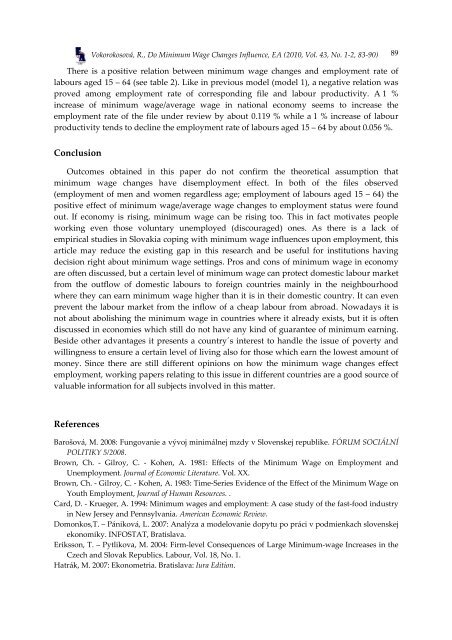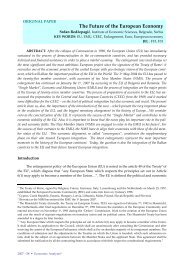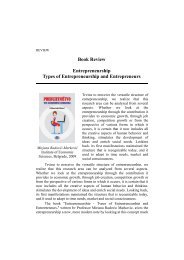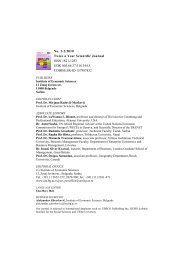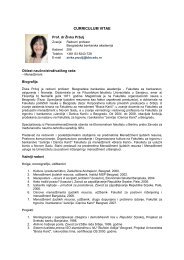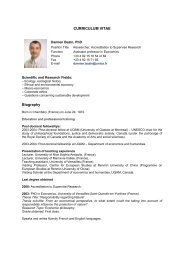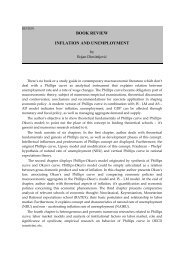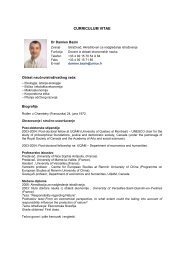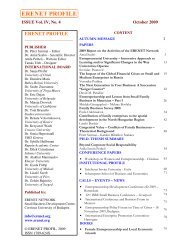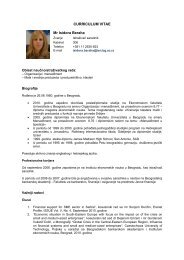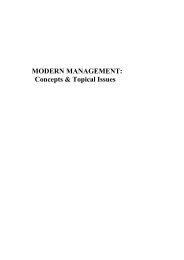Twice a Year Scientific Journal
Twice a Year Scientific Journal
Twice a Year Scientific Journal
Create successful ePaper yourself
Turn your PDF publications into a flip-book with our unique Google optimized e-Paper software.
Vokorokosová, R., Do Minimum Wage Changes Influence, EA (2010, Vol. 43, No. 1-2, 83-90) 89<br />
There is a positive relation between minimum wage changes and employment rate of<br />
labours aged 15 – 64 (see table 2). Like in previous model (model 1), a negative relation was<br />
proved among employment rate of corresponding file and labour productivity. A 1 %<br />
increase of minimum wage/average wage in national economy seems to increase the<br />
employment rate of the file under review by about 0.119 % while a 1 % increase of labour<br />
productivity tends to decline the employment rate of labours aged 15 – 64 by about 0.056 %.<br />
Conclusion<br />
Outcomes obtained in this paper do not confirm the theoretical assumption that<br />
minimum wage changes have disemployment effect. In both of the files observed<br />
(employment of men and women regardless age; employment of labours aged 15 – 64) the<br />
positive effect of minimum wage/average wage changes to employment status were found<br />
out. If economy is rising, minimum wage can be rising too. This in fact motivates people<br />
working even those voluntary unemployed (discouraged) ones. As there is a lack of<br />
empirical studies in Slovakia coping with minimum wage influences upon employment, this<br />
article may reduce the existing gap in this research and be useful for institutions having<br />
decision right about minimum wage settings. Pros and cons of minimum wage in economy<br />
are often discussed, but a certain level of minimum wage can protect domestic labour market<br />
from the outflow of domestic labours to foreign countries mainly in the neighbourhood<br />
where they can earn minimum wage higher than it is in their domestic country. It can even<br />
prevent the labour market from the inflow of a cheap labour from abroad. Nowadays it is<br />
not about abolishing the minimum wage in countries where it already exists, but it is often<br />
discussed in economies which still do not have any kind of guarantee of minimum earning.<br />
Beside other advantages it presents a country´s interest to handle the issue of poverty and<br />
willingness to ensure a certain level of living also for those which earn the lowest amount of<br />
money. Since there are still different opinions on how the minimum wage changes effect<br />
employment, working papers relating to this issue in different countries are a good source of<br />
valuable information for all subjects involved in this matter.<br />
References<br />
Barošová, M. 2008: Fungovanie a vývoj minimálnej mzdy v Slovenskej republike. FÓRUM SOCIÁLNÍ<br />
POLITIKY 5/2008.<br />
Brown, Ch. - Gilroy, C. - Kohen, A. 1981: Effects of the Minimum Wage on Employment and<br />
Unemployment. <strong>Journal</strong> of Economic Literature. Vol. XX.<br />
Brown, Ch. - Gilroy, C. - Kohen, A. 1983: Time-Series Evidence of the Effect of the Minimum Wage on<br />
Youth Employment, <strong>Journal</strong> of Human Resources. .<br />
Card, D. - Krueger, A. 1994: Minimum wages and employment: A case study of the fast-food industry<br />
in New Jersey and Pennsylvania. American Economic Review.<br />
Domonkos,T. – Pániková, L. 2007: Analýza a modelovanie dopytu po práci v podmienkach slovenskej<br />
ekonomiky. INFOSTAT, Bratislava.<br />
Eriksson, T. – Pytlikova, M. 2004: Firm-level Consequences of Large Minimum-wage Increases in the<br />
Czech and Slovak Republics. Labour, Vol. 18, No. 1.<br />
Hatrák, M. 2007: Ekonometria. Bratislava: Iura Edition.


